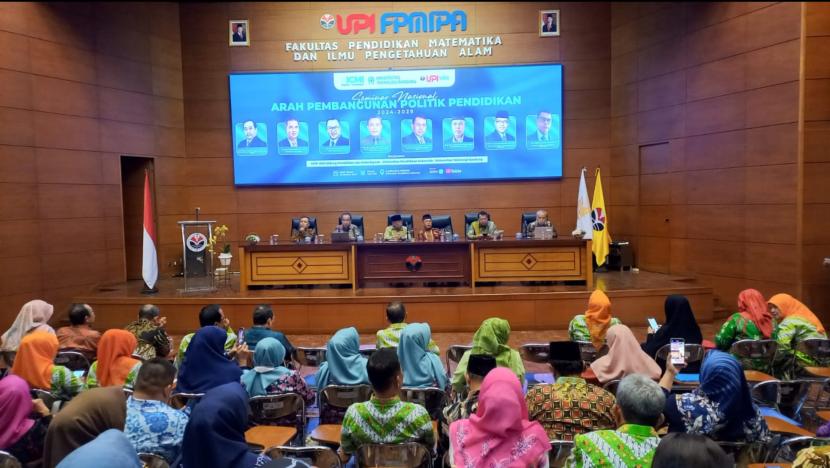REPUBLIKA.CO.ID, Bandung -- The Indonesian Muslim Scholars Association (ICMI) has prepared 10 recommendations for the government of President Prabowo Subianto regarding the direction of Indonesia's education policy in the future. The recommendations resulted from a national seminar held at Universitas Pendidikan Indonesia (UPI) last weekend.
The seminar titled “Political Development of Education” for the period 2024-2029 was initiated by the Central Executive Assembly (MPP) of the Indonesian Muslim Scholars Association (ICMI). Hundreds of participants from lecturers and education activists attended the event.
Those present at the event were UPI Rector Prof. M. Solehuddin, former Rector of Makassar State University (UNM) Prof. Aris Munandar who also served as Chairman of ICMI Orwil South Sulawesi. Plh Assistant I of Jabar Provincial Government Dodo Suhendar, Prof. Muhammad Najib Vice Chairman of ICMI, former Rector of Padang State University (UNP) Prof. Ganefri.
In addition, former Rector of IPB Prof. Herry Suhardiyanto who is also Rector of Muhammadiyah University Bandung attended the seminar. Including education observer Prof. Cecep Darmawan. ICMI managers Orwil West Java and Bandung Raya attended the event including online presence from all over Indonesia.
Head of UPI's Master Teacher Recommendation team Cecep Darmawan said the education world is currently facing challenges at national and global levels. The challenges start from the quality of education, there are still regional disparities, curricula that suit the needs of the goals and the identity of the nation.
In addition, the issue of human resources of educators. Education budget policies, technological disruption to the globalization of education.
“In the midst of these challenges, Indonesia basically has a full commitment to advance Indonesian education contained in the preamble of the basic law,” said the man known as an education observer through an official statement on Monday (27/10/2024).
Under that condition, through a national seminar held by ICMI on Friday (25/10/2024), a man familiar with Cewan said ICMI had drawn up 10 recommendations for the new government. Here are 10 recommendations for the direction of Indonesia's education development in the future.
1. Encourages the government and the Parliament to immediately implement regulation through the revision of the Law of the Republic of Indonesia No. 20 of 2003 on the National Education System (Sisdiknap Law). This Law on Education has been in force for approximately twenty-one years so it requires a more responsive, adaptive, and progressive educational legal policy according to the development of the times and the demands and needs of the educational community.
2.. Encourage the government to make efforts to redefine and redistribute twenty percent of the education budget in the State Budget and Budget in an optimal way to meet the needs of quality national education.
3. Encourage the government to have a focus and commitment to improve the competitiveness of the national education index through various educational program and policy breakthroughs and optimize efforts to meet the eight national education standards fairly and evenly in different regions of the country.
4. Encourage governments to transform education through the development of innovative educational digitization and adaptive to the challenges of educational disruption such as the development of AI and the development of hybrid learning.
5. Encourage the government to optimize the acceleration of the development of world class universities in order to improve the competitiveness of the Indonesian nation and country in the world of education on the global stage.
6. Encourage the government to optimize the development of STEAM (Science, Technology, Engineering, Art, and Mathematics) in the educational environment starting from the elementary level.
7. Encourage the government to evaluate the educational policies that have been implemented so far such as PPDB zoning policy, the Free Curriculum, the selection model for new students in PTN, and various other educational policies that should be reviewed, in order to see the extent of the development of the implementation of these policies and their impact on the education world.
This educational policy evaluation effort is very important in order to determine the future education policy that is more relevant and in line with the national goals of education and the challenges of Indonesia's Golden 2045 demographic bonus era going forward.
8. Urged the government to pay more attention to improving the welfare of teachers and lecturers and educational personnel in the country. In addition, there is a need to strengthen the governance of teachers and lecturers and educational personnel, starting from the aspects of quality, competence, and professionalism, clarity of status and career level, welfare assurance, protection, logging, mapping, and equalizing the distribution of teachers in different areas and fostering and developing the profession of teachers and lecturers in a sustainable manner.
9. Encourage the government to have a commitment to education policies that promote character strengthening aspects by forming a grand design of the future education curriculum rooted in the Indonesian philosophy of Pancasila.
10. Encourage all education stakeholders, especially education tricenters, to actively participate in a comfortable and safe learning ecosystem from all forms of violence in the educational world.
Previously, Sisdiknas' bill was rejected by DPR RI to be included in the national legislative program in 2023. Many people are concerned about some of the contents of the draft.


